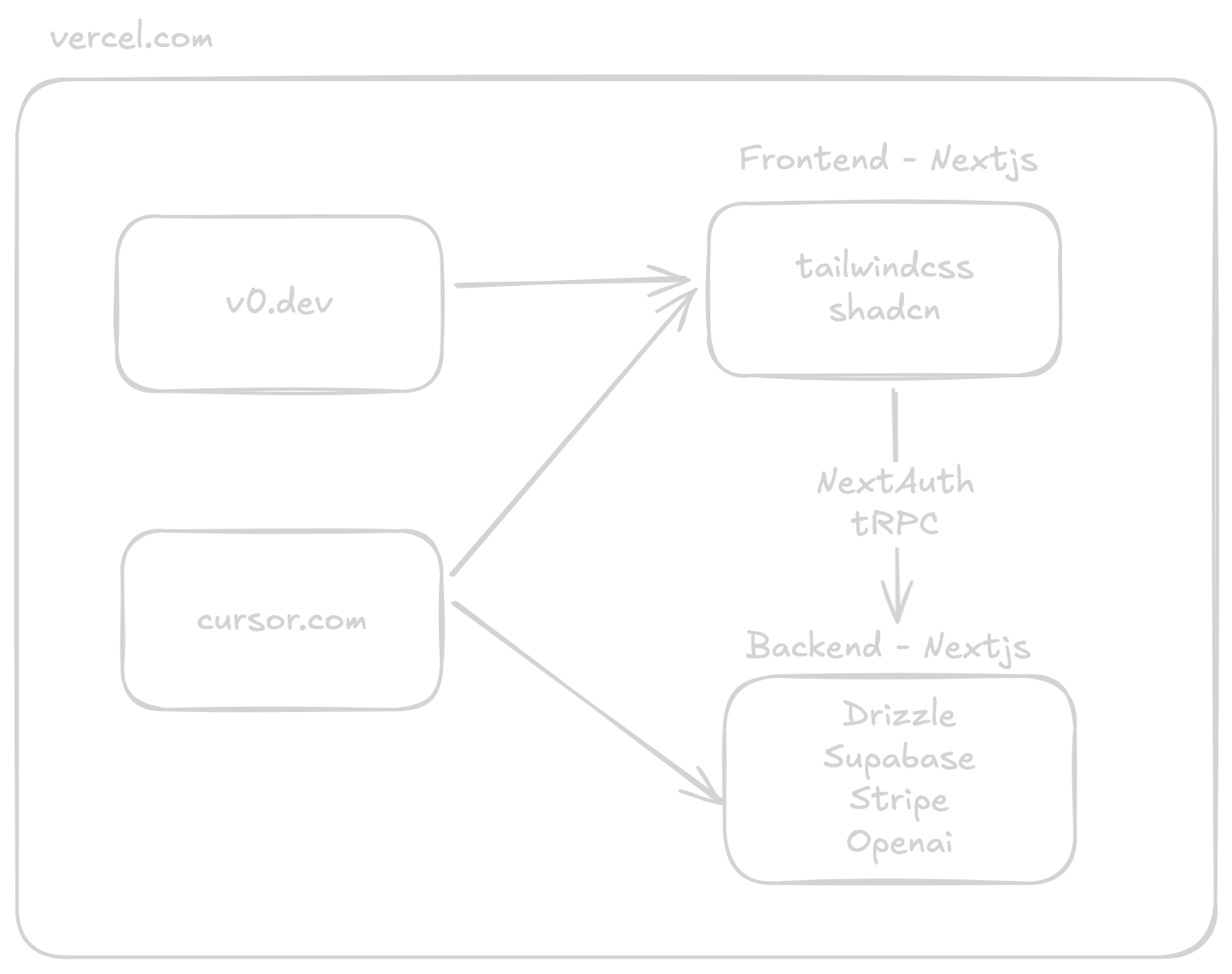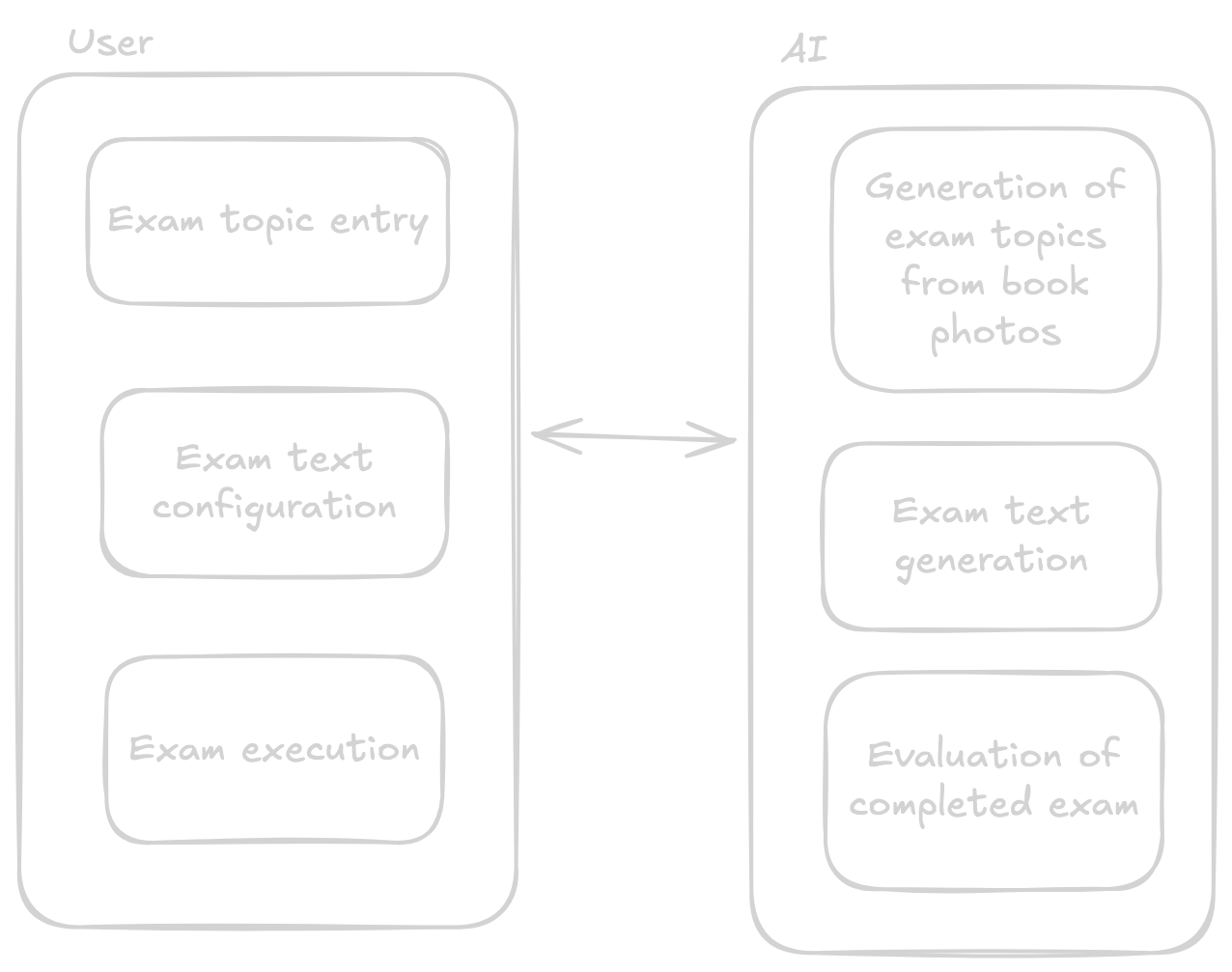Table of Contents

In recent years, artificial intelligence has radically transformed the software development process. In this context, I would like to share the experience of developing ExaminatorAI, a web app, in just 12 hours. This web app is designed to support students in exam preparation. This achievement was made possible by integrating AI with a set of cutting-edge technologies. By leveraging modern tools and AI-powered resources, I was able to significantly streamline both the development and implementation processes, proving how effective and rapid modern software creation can be.
For those interested in starting with AI development, our Introduction to AI Application Development: Where to Start article provides a comprehensive guide for beginners.
Introduction to ExaminatorAI
ExaminatorAI is a platform designed for those preparing for an exam and wishing to rigorously assess their level of preparation. Often, students lack effective self-assessment tools, and ExaminatorAI fills this gap by offering AI-generated and AI-evaluated tests based on the specific topics selected by the user. This capability allows users to engage in a targeted and personalized learning experience, enabling them to hone their skills effectively and focus on the areas that need the most attention. Through its tailored testing features, ExaminatorAI acts as a bridge between theory and practical application, empowering students to be more confident in their knowledge.
Technological Architecture
To develop ExaminatorAI, I adopted a robust and flexible tech stack that allowed for both scalability and rapid iteration. The combination of various tools made it possible to seamlessly connect different components of the application, ensuring reliability and efficiency throughout.
Frontend
- Next.js: A framework for building React applications, enabling server-side rendering and optimized performance.
- TailwindCSS: For modular and highly optimized styling, allowing for responsive and maintainable design.
- Shadcn: A UI component library to accelerate design, providing a consistent visual language across the platform.
- v0.dev and cursor.com: AI tools used to accelerate user interface creation, drastically reducing the time required for initial layouts and modifications.
Backend
- Next.js API Routes: For implementing APIs within the Next.js app, offering a simple and integrated way to build serverless functions.
- Supabase: An open-source backend-as-a-service platform that simplified authentication, database management, and real-time updates.
- Drizzle ORM: A minimalist ORM for database management, providing a straightforward approach to interacting with SQL databases while reducing boilerplate code.
- OpenAI API: The core element for generating and evaluating tests, adding an adaptive and intelligent layer to the application's functionality.
- Stripe: For secure payment management, ensuring reliable and user-friendly monetization features.

Rapid Development with AI Support
Creating the Frontend with v0.dev and cursor.com
The frontend was efficiently developed with the assistance of artificial intelligence. v0.dev was used to generate basic graphical interfaces, allowing rapid iteration of layouts and components, significantly reducing the time usually spent on UI design. The use of v0.dev allowed me to quickly implement and modify components that would have otherwise required more extensive manual coding and testing.
Cursor.com further facilitated development through the use of advanced models, such as Claude and GPT, which helped optimize the frontend and write the backend. AI provided code suggestions, optimized functionality, and resolved issues that would have taken hours of manual debugging. By integrating these AI tools, the development process became significantly smoother, allowing for rapid prototyping and continuous improvement without getting bogged down by minor issues.
Technological Integration
Although the tech stack consists of various tools, their integration was seamless and harmonious, creating a cohesive and efficient workflow:
- Deployment with Next.js on Vercel: Deployment was facilitated by the native integration with Vercel, which fully supports API Routes, ensuring synergy with Supabase. The deployment process was intuitive and enabled continuous deployment, meaning every change could be tested live within minutes.
- Database Management with Drizzle ORM: Drizzle proved to be a lightweight and effective ORM, simplifying CRUD operations without introducing unnecessary complexity. It helped maintain clean and maintainable code, reducing the learning curve for developers unfamiliar with more complex ORM systems.
- UI Components with Shadcn: To avoid building graphical components from scratch, I employed Shadcn, ensuring consistency in design and saving time. Shadcn’s pre-designed components made it easy to implement a professional-looking UI that was both responsive and user-friendly, allowing more focus on the core functionalities of the application.

The Fundamental Role of AI in the Application
AI not only acted as a development support but represents the core of ExaminatorAI. The application leverages AI to provide a sophisticated and personalized experience for users, fundamentally changing how students prepare for exams.
- Customized Exam Generation: Users can upload an image or specify exam topics. The AI, through the OpenAI API, generates a detailed outline and creates a tailored exam for the user. This level of personalization ensures that students can concentrate on specific areas where they may require more practice, rather than following a generic study guide.
- Automated Evaluation: Once the exam is completed, the AI evaluates the responses, providing immediate and in-depth feedback. This instant feedback loop helps students understand their mistakes in real time, allowing them to correct their misconceptions and reinforce their learning. The AI also provides detailed insights into performance metrics, helping students identify patterns in their responses and offering suggestions for improvement.
This approach allows for a highly personalized evaluation service, enabling students to precisely identify the areas in which they need to improve. ExaminatorAI's adaptive nature means that as users continue to engage with the platform, the tests become more attuned to their specific needs, offering a dynamic and evolving learning environment.
For startups looking to implement AI solutions, our article on AI Multi-Agent Solutions for Startups offers valuable insights.
Development Experience and Lessons Learned
The development experience with AI support was extremely positive. In just 12 hours, I was able to transform an abstract idea into a fully operational platform. This demonstrates that, with the right tools, it is possible to realize and validate a project in extremely short timeframes. One of the key lessons learned from this experience was the importance of leveraging AI to eliminate repetitive tasks and focus more on creative problem-solving. The use of AI tools not only accelerated development but also improved the quality of the final product by reducing human errors and increasing efficiency.
Another critical lesson was the value of seamless integration between different technologies. Ensuring that all components of the stack worked well together was crucial in minimizing development time and maximizing productivity. The use of integrated tools like Vercel and Supabase simplified workflows and provided an end-to-end solution that was easy to manage and deploy.
Tips for Other Developers
- Rapid Experimentation: AI allows for rapid prototyping. Be ready to test your ideas in the field without fear of failure. The quicker you can build a minimum viable product (MVP), the sooner you can gather feedback and iterate.
- Use AI Tools: Tools like v0.dev and cursor.com can significantly speed up your workflow. By using these tools, developers can focus more on building unique features rather than getting stuck in routine coding tasks.
- Don't Reinvent Existing Components: Use established libraries for standard elements of your project to focus on innovative aspects. Reusing well-tested components helps ensure stability and reduces the risk of bugs, allowing more time to be dedicated to the unique features of your application.
- Focus on Seamless Integration: A well-integrated tech stack can make all the difference in reducing development complexity. Choose technologies that complement each other well and facilitate smooth data flow and component interaction.
AI and the Future of Small Businesses
I believe that AI will be a cornerstone for small businesses in the future. Those who do not adapt risk being left behind. AI not only speeds up development but also opens new opportunities for creating innovative services with limited resources. By enabling rapid prototyping and development, AI levels the playing field for smaller enterprises that may not have access to large teams or substantial funding.
AI also facilitates the creation of personalized user experiences, which can be a key differentiator for small businesses. By leveraging AI to offer customized services, small businesses can compete more effectively with larger players who may not have the same level of agility or personal touch. In the future, we will see a surge in AI-driven startups that leverage these tools to provide highly niche and personalized solutions.
More and more developers and independent entrepreneurs will be able, thanks to AI, to transform ideas into reality without the need for large teams or significant investments. The democratization of AI tools and platforms means that even individuals with limited technical backgrounds can create sophisticated applications, thereby fostering innovation and diversity in the types of solutions available in the market.
Conclusion
If you have an innovative idea, now is the ideal time to realize it. Thanks to AI and modern tools, barriers to entry have been removed. It is not necessary to be a large team or have considerable budgets. All you need is passion, curiosity, and the determination to experiment. The current landscape of AI tools is geared towards empowering individuals and small teams to achieve what was once only possible for large corporations.
Try it for yourself: visit ExaminatorAI and discover how AI can support you in preparing for your exams. By embracing these new technologies and approaches, you can bring your ideas to life faster and more effectively than ever before.
For more insights on how AI can automate and optimize business processes, check out our article on Automation with RPA and AI: Optimizing Startup Operations.